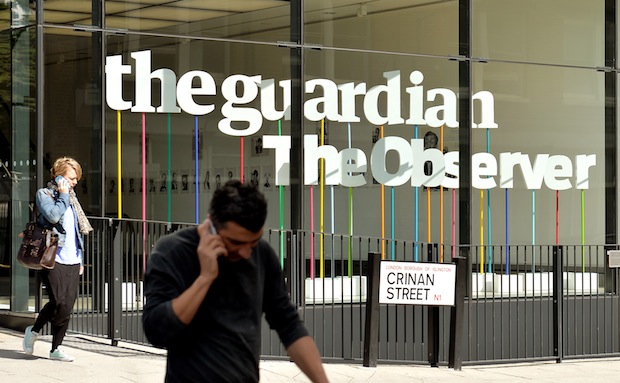The chief executive of The Guardian has delivered a rather grim verdict about the newspaper’s future (or lack thereof). ‘At the moment, I believe we could not survive in the U.K,’ says Andrew Miller, blaming the ‘oversupply’ of newspapers and the omnipresence of the BBC. He has been speaking to the New Yorker magazine which has run one of its brilliant investigations (read it all here) and his verdict is reinforced by the editor, Alan Rusbridger, who (the piece says) ‘can envisage a paperless Guardian in five to ten years’. Rusbridger can also ‘imagine…printing on only certain days’. So the newspaper that came out with the slogan ‘we own the weekend‘ may soon have to add an appendage: ‘Mondays to Fridays… Not so much.’
You don’t have to look hard to see what sparks Rusbridger’s imagination. The Guardian does brilliantly online, with 84 million unique users each month. But print sales have halved over the last ten years and on current trends the paper will lose its last reader by the end of this decade. The Guardian, by some measures, has never been more successful: it is the no3 most-read newspaper in the world amongst people who don’t pay. But it is haemorrhaging sales amongst those who do.
So what’s next? Here’s what the New Yorker says:
‘In fiscal 2012, Rusbridger volunteered to take a pay cut—his second—reducing his salary from £438,000 to £395,000… Miller also voluntarily cut his pay…. To run its print and online operations, the Guardian employs 1,600 people worldwide, including 583 five journalists and a 150 digital developers, designers, and engineers. “The toughest critique of Alan is that he has not faced up to the Guardian’s costs,” a longtime executive at the paper said. The newsroom “is too big for a digital newspaper.”
Miller admits that he does not foresee the newspaper earning a profit anytime soon. Rusbridger said, “The aim is to have sustainable losses.” Miller defines that as getting “our losses down to the low teens in three to five years.” But at some point, if the Guardian does not begin to make money, the trust’s liquid assets, currently £254 million, would be depleted.’
The end of the piece helps explain why Ian Katz, Rusbridger’s former deputy, has jumped off to Newsnight. He’s quoted saying that Rusbridger ‘delegates operationally to his journalists more than any editor I’ve seen’ maintaining tight control only of the ‘big decisions’:
‘Rusbridger doesn’t know what he’ll do when he leaves the Guardian. “We’ve been talking about that,” Lindsay Mackie says. “It might be something to do with music and young people. Access to music, I think.” But for now retirement isn’t up for discussion. “I have an agreement with Alan that we will give each other a year’s notice,” Forgan said. “He has not done that.” Rusbridger says, “Each six months, it becomes a radically different job.” He adds that he could see staying for a while—“whatever ‘a while’ is. I’m enjoying it. The paper is on fire.”’







Comments